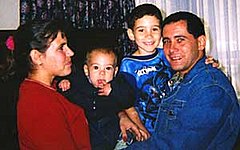About Elián González
- Elián González Brotons (born December 6, 1993) is a Cuban citizen who, as a young boy in 2000, became embroiled in a heated international custody and immigration controversy involving the governments of Cuba and the United States; his father, Juan Miguel González Quintana; his other relatives in Cuba and in Miami, Florida; and Miami's Cuban American community. González's mother, Elizabeth Brotons Rodríguez, drowned in November 1999 while attempting to leave Cuba with González and her boyfriend to get to the United States.
- The U.S.
- Immigration and Naturalization Service (INS) initially placed González with paternal relatives in Miami, who sought to keep him in the United States against his father's demands that González be returned to Cuba. A United States district court ruling from the Southern District of Florida that only González's father, and not his extended relatives, could petition for asylum on the boy's behalf was upheld by the 11th Circuit Court of Appeals.
- After the U.S.
- Supreme Court declined to hear the case, federal agents, by order of U.S.
- Attorney General Janet Reno, took González from the paternal relatives at gunpoint and returned him to his father in Cuba in June 2000. Many Cubans had left Cuba for the United States since the Cuban Revolution of 1959.
- This emigration was illegal under both Cuban and U.S.
- laws; e.g., any Cuban found at sea attempting to reach U.S.
- shores could be deported by the United States or be arrested by Cuban authorities.
- At the time, U.S.
- policy had evolved into a so-called "wet feet, dry feet" rule.
- If a Cuban was picked up at sea or walking toward shore, they were repatriated unless they could make a claim of asylum.
- If they made it to shore (or entered through Mexico) before encountering U.S.
- authorities, they were generally allowed to remain in the country.
Read more at Wikipedia
See Also
- Famous People's Birthdays on 06 December, Cuba
- Famous People's Birthdays in December, Cuba
- Famous military personnel's Birthdays on 06 December, Cuba
- Famous military personnel's Birthdays in December, Cuba
- Famous industrial engineer's Birthdays on 06 December, Cuba
- Famous industrial engineer's Birthdays in December, Cuba


 Date of Birth:
Date of Birth:  Place of Birth: Cárdenas, Matanzas Province, Cuba
Place of Birth: Cárdenas, Matanzas Province, Cuba